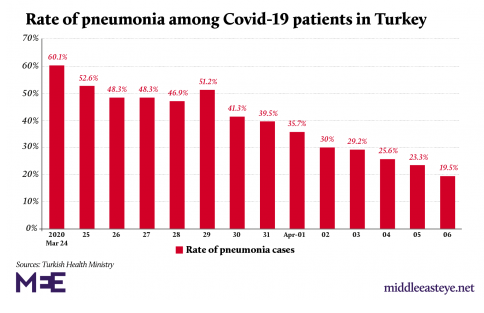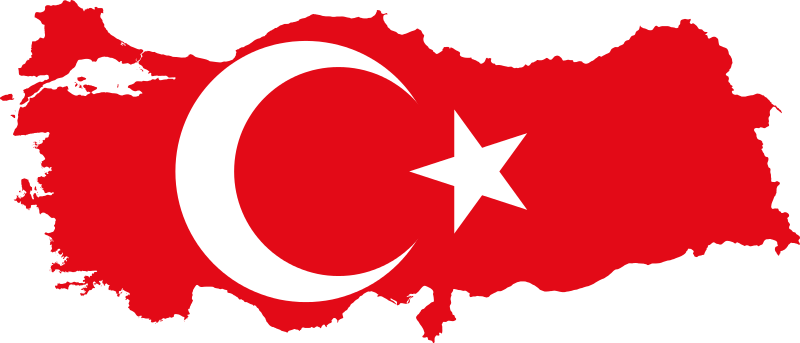Darwinek, CC BY-SA 3.0 <https://creativecommons.org/licenses/by-sa/3.0>, via Wikimedia Commons
Source: Rounding the Earth Author: Mathew Crawford
The forest was shrinking
But the trees kept voting for the axe
For the axe was clever and convinced the trees
That because his handle was made of wood
He was one of them
Turkish proverb
Turkey’s Experience With Early Treatment During the Pandemic
Perhaps due to its position as a corridor between Europe and the Middle East, Turkey’s early pandemic wave infected more of its population than outbreaks in neighbors Iran, Greece, Bulgaria, Armenia, Iraq, and Syria (though data in the latter case may be difficult). However, Turkey managed to treat illness with greater success than most nations.
Turkey’s first case of the novel coronavirus took place on March 11, and quickly spread to all 81 provinces. Instead of going into total lockdown as some nations did, Turkey took relatively mild public health steps such as limiting access to crowded markets and mosques.
The government had already taken steps to stockpile hydroxychloroquine (HCQ) in large quantity in February upon learning of China’s decision to treat with chloroquine. By March 21, Turkey made the decision to treat patients broadly with HCQ. From March 24 to April 6, Turkey saw incidences of pneumonia among COVID-19 patients plummet from just over 60% to just under 20%, indicating that HCQ likely had a strong antiviral effect in patients:

Turkey, which had started the pandemic with horrendous case numbers that were tracking similarly, but just behind those of hard hit Europe, quickly abated and began to converge with those of Asia, where the Indian subcontinent became a source of supply for scores of nations around the world in what might go down in history of one of the greatest acts of medical diplomacy in human history. From Our World in Data:

Some doctors in Turkey also reported using the drug favipiravir with patients, though the success of that potential antiviral is unfortunately barely noted in the early treatment research literature.
However, Turkish researchers (Guner et al) showed substantially lower ICU rates among hospitalized patients taking HCQ rather than favipiravir in one small study.
What we do know, however, is that while never entering into serious lockdown, Turkey crushed the virus—or at least turned into something little more worrying than a common influenza outbreak. By the end of April, 2020, Turkey’s first infection wave was over. A comparison of case fatality rates (CFRs) show Turkey losing a smaller proportion of those who got sick relative to neighbors and the global population. Turkey’s 2.64% CFR during the early pandemic was lower than other neighboring nations with the exceptions of the Central Asian nations of Armenia and Georgia—both of which also used HCQ to treat patients.
- The World CFR of 7.34 was 2.78 times as high.
- Europe’s CFR of 9.95% was 3.77 times as high.
- Asia’s CFR of 3.59% was 1.36 times as high.

CFRs around the world gradually declined throughout 2020. Turkey’s cumulative CFR for all of 2020 was just 0.94% compared to Europe’s 2.30% during the same span. Of course, Western media sprang forth to insist this meant Turkey, a nation behind Western health care standards, was missing deaths (but not cases proportionally?) due to inadequate testing. Or was it that their success was due to testing and tracking entirely superior to that which could be accomplished in the United States?
Sometimes it gets hard to keep up all the inconsistent media narratives.
Turkey’s Vaccination Campaign
On January 14, 2021, Turkey began a large-scale COVID-19 vaccination program that reached over 63% of the population by September 30, 2021. Third doses of either mRNA vaccine or of Sinovac were offered to healthcare workers by early in July. Just as happened throughout most of Europe, Turkey saw a sharp rise in CFR during the first weeks of their vaccination program: from 1.00% to 1.69% after 27 days (cases lagged 18 days, deaths and cases on a 7-day moving average).

Overall, using the current Our World in Data dataset through September 27, 2021, we note that since the outset of the experimental mass inoculation program in Turkey,
- Cases per day are 2.36 times as high as before the program started.
- COVID-19 deaths per day are 2.27 times as high as before the program started (this includes an estimate of how current cases will play out based on prior CFR).
While some commercial media outlets call this result “setting an example for the world”, you can interpret that example for yourself.
Singapore’s Tale of COVID-19, Medicine, and Vaccination – Pandemic National Case Studies
Vietnam’s Tale of COVID-19, Medicine, and Vaccination: Pandemic National Case Studies
Uganda’s Tale of COVID-19, Medicine, and Vaccination: Pandemic National Case Studies
Costa Rica’s Tale of COVID-19, Medicine, and Vaccination: Pandemic National Case Studies

